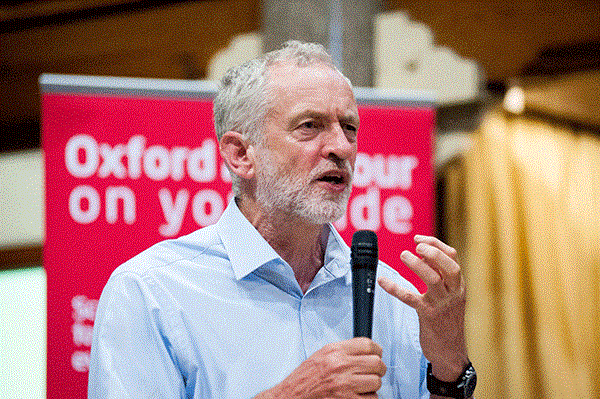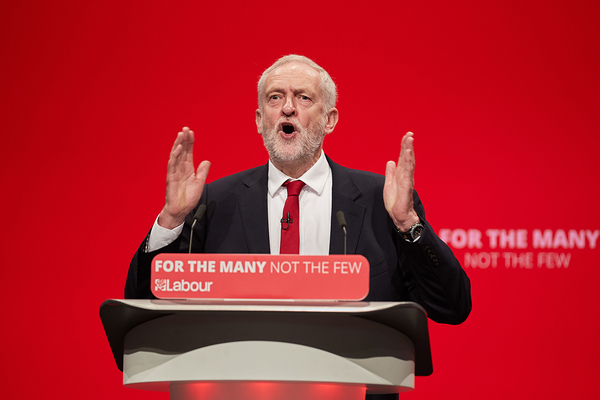You are viewing 1 of your 1 free articles
Labour Party conference roundup
Housing was high on the agenda at last week’s Labour Party conference. Luke Barratt casts an eye over the debates and key policies – and what they could mean should Jeremy Corbyn fulfil his ambition for power
The Labour Party faithful gathered in Brighton last week to chomp on sticks of rock, mooch along the peer with an £8 packet of fish and chips, and lay out their strategy for taking over the country.
Jeremy Corbyn’s party is in a buoyant mood, despite losing the election in June, and optimism is rife that it will soon find itself back inside Downing Street – a feeling which could not be more different from the conference last year.
With this in mind, the sector is more interested than it has been in recent years about what the party is saying on housing policy. It was no surprise to see housing widely debated at the conference: it is a topic that has risen up the political agenda, on which Labour consistently outpolls the Tories, and which remains a pet issue of Mr Corbyn.
Tenant ballots for regeneration
The proposal that caused the biggest stir in the sector was undoubtedly the announcement that a Labour government would introduce tenant ballots for regeneration. While this caused some celebration among opponents of estate regeneration, there was also consternation among those who carry them out – not least some Labour councils in London.
However Labour sources have made clear that the policy is not meant to apply to existing regeneration schemes being carried out by Labour councils. Instead it would come in only under a Labour government, which would provide the necessary funding and powers to make more attractive offers to existing tenants.
This should help align it with the views of Brian Robson, acting head of policy and research at the Joseph Rowntree Foundation, who told Inside Housing: “Ballots are a positive move – it should mean that there’s an attractive offer crafted for tenants – but it does mean that there’ll be a price tag attached to that.”
The final version of London mayor Sadiq Khan’s good practice guide on estate regeneration is imminent, and should make for interesting reading, since the draft version opposed ballots.
James Murray, deputy mayor for housing, told Inside Housing the final draft would “reflect back on what [Mr Corbyn] said”, particularly “around making sure that social housing will be provided and residents having a full say”.
Social housing review
Following Sajid Javid’s big announcement that the government is starting work on a Social Housing Green Paper, Labour promptly announced its own parallel review the following week.
While there may be few in the sector rejoicing at yet more expert reviews of the problem, it seems at least like astute politics from Labour. It will allow the two parties’ proposals to be compared and examined and could push the Tories to more radical suggestions than they might otherwise have considered.
Nonetheless, perhaps the suggestion of David Orr, chief executive of the National Housing Federation, that the green paper should be cross party would be the most pragmatic use of energy for all concerned.
Rent controls
The studied vagueness of Mr Corbyn’s support for rent controls means the debate about their relative merits has been mostly hypothetical.
The precise detail of the rent controls Labour intends to introduce is still largely unclear, but Inside Housing understands that it intends to go beyond what was proposed in the 2017 manifesto. In that document, the party pledged mandatory three-year tenancies with a cap on rent increases in this period at inflation.
The main criticism of rent controls is that they harm supply by encouraging landlords to sell rather than rent, and so for the policy to work, Labour would also have to follow through on its promises to increase council housebuilding with measures such as lifting the Housing Revenue Account (HRA) borrowing cap.
Dr David Madden, assistant professor in sociology at the London School of Economics, told Inside Housing: “Whatever form it takes, it’s important for rent control to be part of a broader strategy to change the housing system. It needs to be combined with a whole set of policies such as new council housing, increased security of tenure, restrictions on speculation, and measures against land-hoarding.
“There are a lot of different versions of rent control. But a really radical approach would be one that doesn’t pursue rent control in isolation but instead enacts a more comprehensive set of changes to democratise the housing system.”
Grenfell
The June fire at Grenfell Tower has remained high on the party’s agenda.
Unsurprisingly, it was referenced in Mr Corbyn’s conference speech, in which he chose – rather than discussing policies on fire safety – to use Grenfell Tower as a prism through which to discuss housing policy in general.
A motion the day before had called on the public inquiry into the fire to address the “deregulatory agenda” pursued by various governments since the 1980s and followed a similar approach to the leader, using the importance of making council homes safe as a reason to propose the lifting of the HRA borrowing cap.










